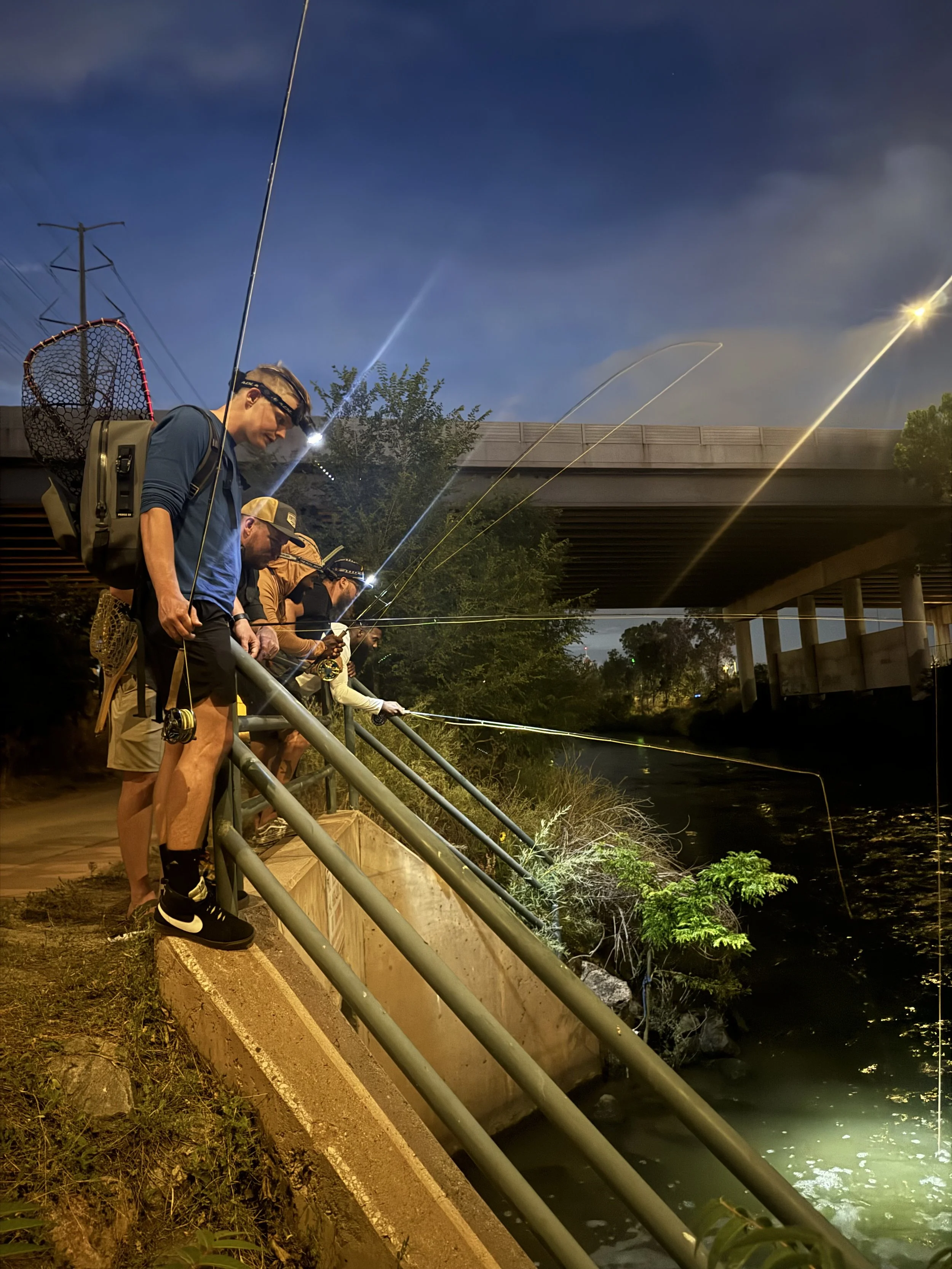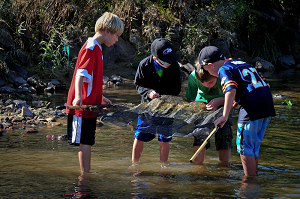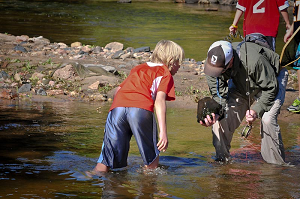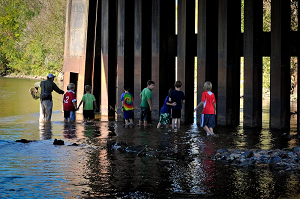The Purgatoire River is a major headwater tributary of the Arkansas River, draining a large portion of southeastern Colorado. From the headwaters on the eastern slopes of the Culebra Range, the river flows east for approximately 50 miles to the City of Trinidad. Trinidad has through its history been plagued by several damaging flood events, and in 1958, the US Congress authorized construction of the Trinidad Dam and Reservoir (Trinidad Project) under the Flood Control Act of 1958. The primary purpose of the project was to provide flood control, as well as storage for irrigation and recreational use.
The Trinidad Project dam and reservoir have dramatically altered the natural flow regime of the Purgatoire River. The pre-project river hydrology was principally snow-melt driven, with additional influence from high-intensity, short duration storm events during the summer monsoon season. Prior to construction of the reservoir, the Purgatoire River typically experienced peak flows during the snow melt run-off in May and June, with additional storm driven peaks in July and August. Base flows typically occurred from mid-September through early April. Reservoir operations have flattened out the annual hydrograph, limiting the peak run-off flows below the dam, and significantly extending the period of higher than natural flows beginning earlier in the spring through the late summer into fall. Releases from the dam correspond to a designated irrigation season, and flows during the non-irrigation season are limited, with the only flow in the river downstream of the dam coming from Raton Creek and a few other intermittent tributaries.
In 2010, the Purgatoire River Anglers Chapter of Trout Unlimited contracted with Fin-Up Habitat Consultants, Inc. to conduct an assessment of existing aquatic habitat conditions and a feasibility study for a cold water habitat improvement project on a segment of the Purgatoire River within the City of Trinidad. Funding for the assessment came from a Trout Unlimited Embrace-A-Stream grant the Chapter had applied for in the 2010 grant cycle, as well as a small contribution from the Cheyenne Mountain Chapter of TU in Colorado Springs. The purpose of this assessment was to evaluate the existing condition of the river, including available habitat for resident trout, to identify segments of the stream for restoration, and to develop a planning document for future projects.
The assessment was completed during the summer of 2011. The results of the assessment indicated that the severely reduced winter flows below Trinidad Dam are likely to limit the potential fishery in the Purgatoire River through the City of Trinidad, Colorado. Interviews with long time residents and local fisherman, did indicate that a remnant population of trout does persist in the study reaches, and many of the river’s stakeholders in the region are convinced that the creation of an urban recreational fishery is in the best economic and social interests of the community. Although a self-sustaining population of trout might be difficult to establish, there was an opportunity to create a seasonal “put-and take” fishery within the city limits of Trinidad, which would provide recreation enhancements including easier and more controlled access to the river corridor for residents. While an enhancement project of this nature could not address the limited flow issue, the work would provide velocity shelter and in-channel holding cover for stocked fish during the sustained higher flow period. A project could provide seasonal fishing opportunities from April through October each year, and would address many of the access, dispersed recreation, and bank stability issues. Following this enhancement concept, the assessment analyzed the potential of each reach for a project of this type. Concept plans for Reach 3, 4 and 5, in the central downtown area of the City of Trinidad were developed, and are described, in order of recommended priority.
 The stakeholders for the Trinidad / Purgatoire River effort include a diverse mix - Purgatoire River Anglers – Trout Unlimited, The City of Trinidad, Pioneer Natural Resources Company, The Purgatoire River Water Conservancy District, The Trinidad Community Foundation, and Colorado Department of Parks & Wildlife. The project stakeholders agreed that Reach 4 would be the first priority, and would be used as a demonstration project to assess the value of creating a “put-and-take” fishery in the heart of downtown Trinidad. Planning for implementation of the project began in the summer of 2011, with a target date of completion by early summer in 2012. Construction of the Trinidad / Purgatoire River Reach 4 Demonstration Project began on February 23, 2012. The project began with the stockpiling of 600 tons of boulders at two sites near the upstream and downstream boundaries of the reach. Boulders were then distributed to the individual habitat feature locations within the river channel by a loader.
The stakeholders for the Trinidad / Purgatoire River effort include a diverse mix - Purgatoire River Anglers – Trout Unlimited, The City of Trinidad, Pioneer Natural Resources Company, The Purgatoire River Water Conservancy District, The Trinidad Community Foundation, and Colorado Department of Parks & Wildlife. The project stakeholders agreed that Reach 4 would be the first priority, and would be used as a demonstration project to assess the value of creating a “put-and-take” fishery in the heart of downtown Trinidad. Planning for implementation of the project began in the summer of 2011, with a target date of completion by early summer in 2012. Construction of the Trinidad / Purgatoire River Reach 4 Demonstration Project began on February 23, 2012. The project began with the stockpiling of 600 tons of boulders at two sites near the upstream and downstream boundaries of the reach. Boulders were then distributed to the individual habitat feature locations within the river channel by a loader.
Construction then began at the upstream boundary of the reach, under the I-25 bridge, and worked downstream to a point just upstream of the Colorado Division of Water Resources stream gauge at the North Commercial Street bridge. Heavy equipment construction of in-channel habitat and stream-bank stabilization features was completed by Friday, March 9, 2012.
 Following the heavy construction activities in the river and along the access trail, the Purgatoire River Anglers chapter of Trout Unlimited organized a volunteer workday in the project reach on April 15, 2012. Eleven volunteers worked to clean up the boulder stockpile sites, reseed disturbed areas, harvest willow cuttings, and plant willow and sedge along the newly constructed bank-full riparian benches. A total of 41 hours of volunteer effort were utilized to put the finishing touches on the river work. In early May, members of Trout Unlimited completed the final phase of the project, with the stocking of several hundred catchable rainbow trout throughout the project reach.
Following the heavy construction activities in the river and along the access trail, the Purgatoire River Anglers chapter of Trout Unlimited organized a volunteer workday in the project reach on April 15, 2012. Eleven volunteers worked to clean up the boulder stockpile sites, reseed disturbed areas, harvest willow cuttings, and plant willow and sedge along the newly constructed bank-full riparian benches. A total of 41 hours of volunteer effort were utilized to put the finishing touches on the river work. In early May, members of Trout Unlimited completed the final phase of the project, with the stocking of several hundred catchable rainbow trout throughout the project reach.
Article and photos courtesy of Pete Gallagher, Fin-Up Habitat Consultants, Inc. To read the full project report, please visit this link.















